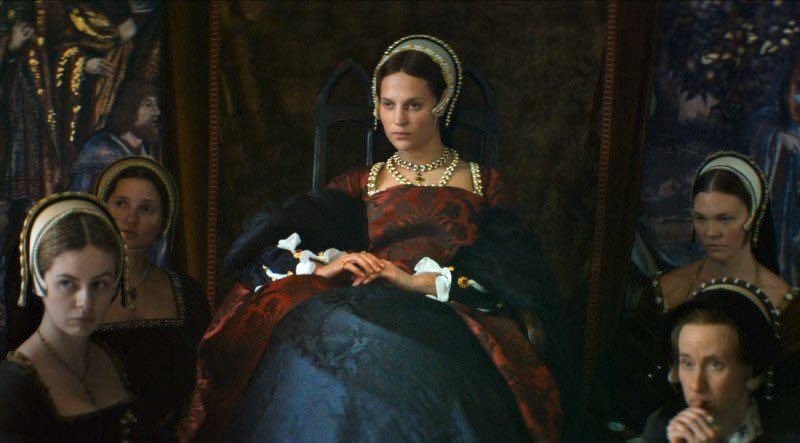Growing up, I was absolutely fascinated with the Tudors. Henry VIII and his six wives were so intriguing to me that I ate up every novel and non-fiction book I could find. So when watching Karim Aïnouz's Firebrand, I enjoyed the little nods to history and its approach to playing with the personalities of Henry's court. Catherine Parr is often the wife that is focused on the least, but out of all the king's wives, she is the only one who survived. She had a major influence on Henry's surviving children, Edward, Mary, and the eventual Queen of England, Elizabeth I.
Firebrand starts in 1546, centering the story around Catherine and the last days of Henry's reign. While some aspects of the film are true, like Catherine stepping in as regent while Henry is off at war with France, or Catherine publishing her own book under her name, Aïnouz doesn't seem concerned with facts. Writers Jessica and Henrietta Ashworth based the script on Elizabeth Fremantle's novel Queen's Gambit, but it seems like in this telephone game of Catherine Parr's history, things were lost in translation.
'Firebrand' Paints a Sumptuous if Inaccurate Portrait of England
As casual as Firebrand is with the facts, one thing can't be denied, and it's Aïnouz's luscious England. Through his eyes, every scene feels like a painting plucked out of the archives of the Dutch masters. Flawless and period-accurate costuming comes in rich jewel tones, and the actors are bathed in soft golden light in their dark, wood-paneled rooms. I don't blame Aïnouz for lingering long on such scenes. The film is as its best when allowing us to watch the subject uninterrupted and admire just how much work was put into the lovely costume and production design.
But for a film determined to let Catherine tell her story, it's one that is also obsessed with showing us her pain and suffering at the hands of her husband. While it is true that there are accounts that state Henry VIII slowly descended into some sort of madness toward the end of his life (potentially because of syphilis), Firebrand is determined to show us endless shots of Jude Law in a ridiculous fat suit screaming and throwing a fit like a little child. To Law's credit, he fully leans into a character that is more in line with Joffrey Baratheon than any historical figure. He doesn't hesitate to turn into a mercurial man who is as fickle as he is childish.
Alicia Vikander's Catherine is left to suffer through her husband's whims. While most of it is emotional manipulation, at one point we are subjected to a near-rape, and I have to ask, why was this necessary? We're already forced to sit through multiple sex scenes where an obese and heavy-breathed Henry has sex with Catherine, we get the message. He's gross, she doesn't really want to be there. There's a glimpse of the future in the film, as we know that Catherine will eventually marry Thomas Seymour. Fremantle's novel focuses more on this star-crossed lovers angle, while Firebrand tosses it aside.
'Firebrand' Is a Tonal Mess, and It Doesn't Know What It Wants To Be
At one point in the film, after Henry has finished seducing a woman right in front of Catherine and their court, she tells the girl to stop laughing as she has been tittering the entire time. While the laughter was certainly an intentional choice on behalf of the character, it speaks to a larger issue in the film. Firebrand is bizarrely littered with characters who can't seem to stop giggling. In scenes when someone is being reprimanded, in scenes that are meant to convey gravitas, during a pivotal conversation between two characters, someone is always smirking or giggling in the back.
Why is everyone laughing? Is it meant to show the irreverence and corruption of the court? Is it because they're so inured to Henry's whims that anything can be amusing? It's unclear because we don't ever really know anything about the characters that surround Henry or Catherine. Some are given deep and meaningful lines, but because we don't care about them or know their names, nothing lands the way it's meant to.
Adding to the problems with tone, the film's pacing is all over the place. The beginning is a slog, picking up when Henry shows his true malice, but then slows down again toward the end. These would be smaller quibbles if the story wasn't so egregiously wrong. I'm by no means a staunch loyalist to historical facts. Historical fiction is just that: fiction. But Firebrand fails to do it in a way that punctuates a point.
Who is the titular firebrand of this story? Is it Catherine? It rarely feels like that is the case. As resilient as she is, she's nowhere near as passionate or ferocious as her friend Anne Askew (Erin Doherty) or even her political opponent Stephen Gardiner (Simon Russell Beale). It is only toward the end that we see her fangs but, by that point, the story has derailed so far off base that it's hard to applaud Catherine for this sudden commitment to violence and passion. With a messy story and confusing characters, Aïnouz's Firebrand is a disappointment to behold no matter how exquisite the film looks.
Rating: C
Firebrand had its world premiere at the 2023 Cannes Film Festival.



